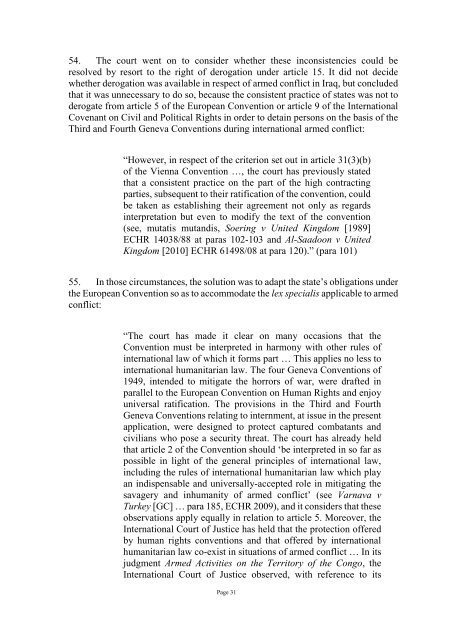Serdar Mohammed (Respondent) v Ministry of Defence (Appellant)
uksc-2014-0219-judgment
uksc-2014-0219-judgment
Create successful ePaper yourself
Turn your PDF publications into a flip-book with our unique Google optimized e-Paper software.
54. The court went on to consider whether these inconsistencies could be<br />
resolved by resort to the right <strong>of</strong> derogation under article 15. It did not decide<br />
whether derogation was available in respect <strong>of</strong> armed conflict in Iraq, but concluded<br />
that it was unnecessary to do so, because the consistent practice <strong>of</strong> states was not to<br />
derogate from article 5 <strong>of</strong> the European Convention or article 9 <strong>of</strong> the International<br />
Covenant on Civil and Political Rights in order to detain persons on the basis <strong>of</strong> the<br />
Third and Fourth Geneva Conventions during international armed conflict:<br />
“However, in respect <strong>of</strong> the criterion set out in article 31(3)(b)<br />
<strong>of</strong> the Vienna Convention …, the court has previously stated<br />
that a consistent practice on the part <strong>of</strong> the high contracting<br />
parties, subsequent to their ratification <strong>of</strong> the convention, could<br />
be taken as establishing their agreement not only as regards<br />
interpretation but even to modify the text <strong>of</strong> the convention<br />
(see, mutatis mutandis, Soering v United Kingdom [1989]<br />
ECHR 14038/88 at paras 102-103 and Al-Saadoon v United<br />
Kingdom [2010] ECHR 61498/08 at para 120).” (para 101)<br />
55. In those circumstances, the solution was to adapt the state’s obligations under<br />
the European Convention so as to accommodate the lex specialis applicable to armed<br />
conflict:<br />
“The court has made it clear on many occasions that the<br />
Convention must be interpreted in harmony with other rules <strong>of</strong><br />
international law <strong>of</strong> which it forms part … This applies no less to<br />
international humanitarian law. The four Geneva Conventions <strong>of</strong><br />
1949, intended to mitigate the horrors <strong>of</strong> war, were drafted in<br />
parallel to the European Convention on Human Rights and enjoy<br />
universal ratification. The provisions in the Third and Fourth<br />
Geneva Conventions relating to internment, at issue in the present<br />
application, were designed to protect captured combatants and<br />
civilians who pose a security threat. The court has already held<br />
that article 2 <strong>of</strong> the Convention should ‘be interpreted in so far as<br />
possible in light <strong>of</strong> the general principles <strong>of</strong> international law,<br />
including the rules <strong>of</strong> international humanitarian law which play<br />
an indispensable and universally-accepted role in mitigating the<br />
savagery and inhumanity <strong>of</strong> armed conflict’ (see Varnava v<br />
Turkey [GC] … para 185, ECHR 2009), and it considers that these<br />
observations apply equally in relation to article 5. Moreover, the<br />
International Court <strong>of</strong> Justice has held that the protection <strong>of</strong>fered<br />
by human rights conventions and that <strong>of</strong>fered by international<br />
humanitarian law co-exist in situations <strong>of</strong> armed conflict … In its<br />
judgment Armed Activities on the Territory <strong>of</strong> the Congo, the<br />
International Court <strong>of</strong> Justice observed, with reference to its<br />
Page 31


